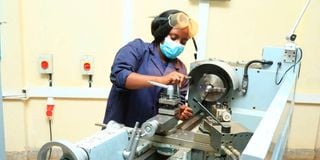New funding model revamps TVETs

A mechanical engineering student operates a lathe machine at Nyeri National Polytechnic in June 2021.
What you need to know:
- Mr Machogu said the funding model launched by the President on May 3, 2023, places applicants along five bands based on their household income
- He said 13 national polytechnics have been upgraded by the Kenya Kwanza administration
- Mr Machogu said the government has established 113 Jitume Centres in various parts of the country
The new funding model has revamped the Technical Vocational Education and Training (TVET) sector with a total of 53,542 students of Kenya Certificate of Secondary Education (KCSE) 2022 cohort benefitting under the program.
The state has so far disbursed Sh1.95 billion to the beneficiaries.
“The Government rolled out the new funding model for the TVET sector that seeks to make education accessible and inclusive to all, in line with the recommendations of the Presidential Working Party on Education Reforms,” said Education Cabinet Secretary Ezekiel Machogu.
Mr Machogu said the funding model launched by the President on May 3, 2023, places applicants along five bands based on their household income.
The funding model is structured in terms of loans, scholarships and household contributions.
The TVET funding has the students in the first band getting scholarships of 70 per cent and loans of 22.5 per cent and a household contribution of 7.5 per cent.
“On the extreme end, students may get scholarships of 30 per cent, loans of 43 per cent and household contribution of 27 per cent. Some 53,542 students of the KCSE 2022 cohort have benefitted under this program to the tune of Sh1.95 billion,” he added.
The CS said other recommendations from the Presidential Working Party that are at various stages of implementation include institutionalisation of linkages with industries, strengthening the Open, Distance and e-Learning (ODeL).
“Implementing the Competency-Based Curriculum, promotion of lifelong learning, streamlining Technical Trainer Management in TVET through the Kenya School of TVET and digitization of its curriculum delivery process among others,” he added.
In an interview with Nation, the CS said the government continues to invest and expand the TVET space. Currently, there are 24 National Polytechnics, with over 200 technical vocational colleges spread across the country.
He said 13 national polytechnics have been upgraded by the Kenya Kwanza administration to ensure at least one National Polytechnic is established in each county.
“In addition to that, 16 new Technical and Vocational Colleges (TVCs) will be constructed in constituencies this Financial Year, in line with the policy of establishing one TVC per constituency,” said the CS.
Mr Machogu said the government has established 113 Jitume Centres in various parts of the country for the unemployed youth to earn decently through working for various international firms in the digital space.
He said some 10,780 devices have been provided for use within those established centres, and trained 370 tutors from various TVETs to support the programme.
The CS urged more youths to enroll into the Jitume programme to be trained in digital skills.
“We expect the number of centres and enrollment to grow. The Jitume centre at Kisumu National Polytechnic has trained 600 youths in digital skills and released them to the market, with a current cohort of 200 undergoing training,” he added.
He said the Jitume programme is key in empowering the youth to earn a living.
The CS said the youth trained at the institution are earning between Sh7,000 and Sh25,000 per week from the digital jobs they have secured online.




